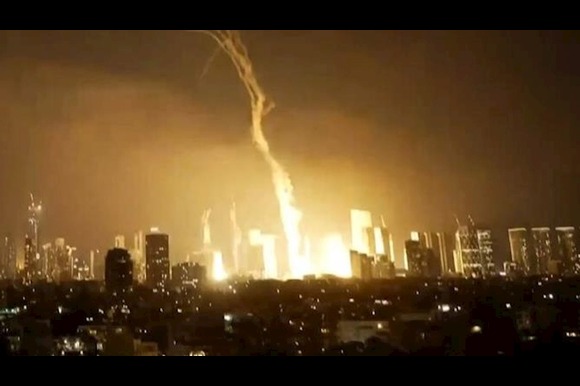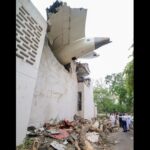Iran has launched multiple waves of ballistic missile strikes against Israel in retaliation for a major Israeli attack targeting its nuclear facilities and senior military officials, marking a dramatic escalation in tensions between the two nations.
Explosions echoed across Tel Aviv and Jerusalem on Friday night as air raid sirens wailed throughout Israel. The missile barrage came just hours after an unprecedented Israeli offensive early Friday struck key Iranian nuclear sites and targeted top Iranian military leaders and scientists. Iran’s Supreme Leader Ayatollah Ali Khamenei declared that Israel had “initiated a war” and vowed that Tehran would not tolerate such “hit-and-run” operations without a forceful response.
“The Zionist regime [Israel] will not remain unscathed from the consequences of its crime. The Iranian nation must be guaranteed that our response will not be half-measured,” Khamenei said in an official statement.
Iran’s Islamic Revolutionary Guard Corps (IRGC) confirmed that it had launched a “crushing and precise response” by targeting dozens of Israeli military installations and airbases, all under the direct command of Supreme Leader Khamenei.
Iranian state media reported that three separate waves of missile attacks were launched Friday night, with hundreds of projectiles aimed at Israeli territory. Al Jazeera’s Nour Odeh, reporting from Amman, Jordan, noted that at least one missile struck central Tel Aviv.
In contrast, the Israeli military claimed that Iran had launched fewer than 100 missiles and asserted that most were intercepted or failed to reach their targets. U.S. military forces also assisted Israel in intercepting incoming missiles, according to unnamed American officials cited by Reuters and the Associated Press.
Despite these defensive efforts, a residential high-rise in central Tel Aviv was struck during the assault. Live footage from the scene showed fires raging in several apartments and smoke pouring from the building. Adjacent structures also suffered damage, with windows shattered and metal debris hanging from their facades.
Israeli emergency services reported that at least 40 people were injured in the attack, according to the local outlet Haaretz. Earlier reports from Israel’s ambulance service indicated that two critically wounded individuals remained trapped inside a damaged building in the Tel Aviv metropolitan area.
Authorities advised residents to avoid public areas and take shelter in designated “protected spaces” as a precaution during the missile strikes.
“This was an extensive volley of ballistic missiles, something that Tel Aviv is not used to,” Odeh observed. “Psychologically … the sight of damaged buildings, of emergency service providers trying to get people out of those buildings and out of the shelters, this is quite powerful for the Israeli public.”
In response to the ongoing threat, Iran temporarily closed its airspace until 2 p.m. local time on Saturday. Meanwhile, Tehran activated air defense systems in anticipation of additional Israeli airstrikes, according to Iran’s state news agency IRNA.
‘The Gates of Hell Will Open’: Iran Vows Harsh Retaliation Following High-Level Casualties
Friday’s Israeli attack marked a significant escalation, resulting in the deaths of multiple senior Iranian military leaders and nuclear scientists. Among those reportedly killed were Major-General Mohammed Bagheri, the chief of staff of Iran’s armed forces, and IRGC chief Hossein Salami. Major-General Mohammed Pakpour has since been promoted to replace Salami.
Iran’s ambassador to the United Nations, Amir Saeid Iravani, addressed the UN Security Council, claiming that Israel’s strikes killed 78 people and injured more than 320 others, including women and children.
In a public letter read on Iranian state television, newly appointed IRGC commander Pakpour promised a fierce response: “The gates of hell will open to the child-killing regime,” referring to Israel.
The Israeli military said its surprise operation struck over 200 Iranian targets, including nuclear and military facilities. Prior to Iran’s missile retaliation, Israeli military spokesperson Brigadier-General Effie Defrin briefed journalists, stating that Israel was “continuing to strike.” He emphasized that Iran posed a substantial threat to Israel’s civilian population and revealed that the army had targeted the Isfahan nuclear facility, with the operation “still ongoing” at the time.
Iran’s Atomic Energy Organization confirmed that its Isfahan and Fordo nuclear sites had been targeted but reported that damage was limited and had not resulted in widespread contamination. “The damage was not extensive and there is no cause for concern in terms of contamination,” said agency spokesperson Behrouz Kamalvandi. He noted that warehouses had caught fire in Isfahan, while damage at Fordo remained confined to non-urban areas.
Additionally, Israel reportedly launched attacks on the Natanz nuclear enrichment facility. The head of the International Atomic Energy Agency (IAEA), Rafael Grossi, confirmed that the site had suffered damage. He warned of some radiological and chemical contamination inside the facility but said it was manageable with the appropriate safety protocols.
Earlier on Friday, Israeli Prime Minister Benjamin Netanyahu acknowledged the likelihood of multiple Iranian retaliatory strikes in response to the Israeli operation. Later that night, during Iran’s missile attack, Netanyahu addressed the Iranian people directly, framing the Israeli military action as a defensive measure.
“Our operation aims to thwart the Islamic regime’s nuclear and ballistic missile threat,” Netanyahu said. “As we achieve our objective, we are also clearing the path for you to achieve your freedom. The regime does not know what hit them, or what will hit them. It has never been weaker. This is your opportunity to stand up and let your voices be heard.”
As the region braces for further escalation, the international community is watching closely for what could become a prolonged and volatile confrontation between Israel and Iran, with far-reaching implications across the Middle East.






